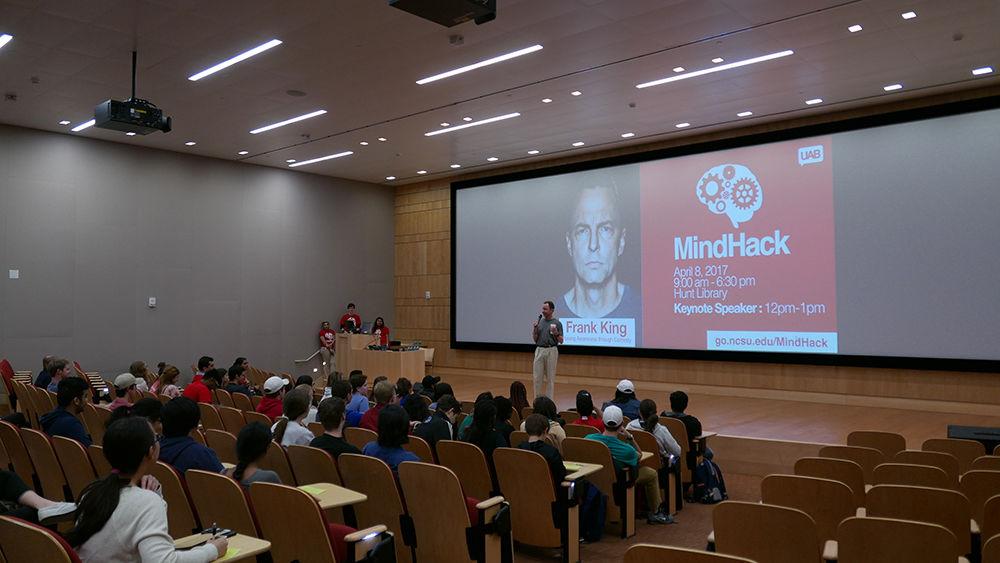On Saturday, students gathered to participate in MindHack, an event focused on tackling mental health issues along with a variety of mental health focused activities in Hunt Library and on Centennial campus. Participants were split into teams and came up with a solution to a case study related to mental health. They spent the day developing an idea that they later presented in front of a panel of judges, competing for a series of prizes given to the first and second place teams.
The MindHack executive team spent over two months planning the event hosted by the Union Activities Board. They partnered with the Mental Health Ambassadors, Counseling Center and the Association of Student Governments (ASG). The event was directed and organized by Priya Loganathar, a junior in biomedical engineering and ASG delegate for NC State. Loganathar says she wanted to host an event that would help reduce the stigma surrounding mental health while also tapping into innovative minds at NC State.
“The idea behind MindHack is to promote [mental health] not just as a social problem but as a scientific problem that needs to be solved,” Loganathar said. “This is a problem in medicine and we can do something about it if we come together and have a conversation about it just like you would have a conversation about someone suffering from cancer or cardiovascular disease.”
Before teams began brainstorming their product to help the subject of the case study, a fictional character in college struggling with depression and anxiety, they were guided through the innovative process by team members* of Paradigm Innovation + Design, a Raleigh-based company.
Paradigm Innovation + Design was started by Sunny Su, an alumnus of NC State who graduated in 2016 with a degree in Industrial Design. He worked frequently with the Entrepreneurship Initiative Garage where he saw a shortage of designers and people focused on the creative process in entrepreneurship. This inspired him to create a multidisciplinary company focused on evaluating a product’s feasibility, viability and desirability.
“I think the next big thing we’re going to tackle as humanity as a whole is going to be mental health differences… and I think it’s great what [MindHack participants] are doing here, getting started on it now,” said Sunny Su, the director of Paradigm Innovation + Design.
MindHack keynote speaker Frank King, comedian and mental health activist, shared his story about battling depression through comedy. His address featured personal stories and experiences related to depression and suicide. Students filled the Duke Energy Auditorium in Hunt Library to hear the 60 year old TED speaker tackle issues like depression and suicide head-on through comedic storytelling.
He started his talk with facts about mental illnesses and a call to action.
“From a college perspective, 24,000 college students attempt suicide every year… 1,100 actually end their lives every year,” King said. “That works out to three a day, every day. The good news is: we can do something about that. You can do something about that. You can make a difference. You can save a life, and it can be as simple as starting a conversation.”
He shared his perspective as a comedian and entertainer with depression. King stated how people with depression are great actors and sometimes use comedy as a coping mechanism. He called suicide a “crime of opportunity” and shared how he lives with an illness that took both his grandmother and great aunt.
“My car broke down a couple of months ago,” King said. “I had three thoughts, unbidden. First thought: get it fixed. Second thought: buy a new one. Third thought: I could just kill myself. It just pops into my head.”
King also stressed the importance of starting the conversation about depression, suicide and mental health issues. He said by openly talking about them, people can desgitmatize mental health and begin providing the non-judgemental support people need.
Yussef Guerrab, a freshman studying applied mathematics, said he appreciated how King started the conversation and shared information on resources and tools people could use to learn more about mental health.
“I definitely liked what he had to say and the ideas he brought up,” Guerrab said. “They were definitely ideas that we’re all aware of and have heard, but we never actually talk about them or put them into perspective.”
At the end of the event, each team showcased their idea in a 5-minute pitch in front of the judges and other teams. The ideas included applications focused on self-care and seeking professional help, an educational online training program, and mental health tracking systems.
The winning team created an idea for a app called First Step that provided gamified way to keep track of the user’s mental health. Spondon Kundu, a graduate student studying electrical engineering, Sriya Madapusi Vasudevan, a junior studying computer science, Elizabeth Alberto, a junior studying computer science, and Eman Alhajji, a junior studying materials science and engineering, received the grand prize and the opportunity to develop their idea with advice and consultation from Paradigm Innovation + Design.
Loganathar looks forward to organizing and expanding MindHack for future years.
“This is exactly what we wanted to see come out of the event: tangible solutions to this problem of mental health,” Loganathar said. “It’s amazing that everyone across different majors and backgrounds could come together and work as a team.”
There were additional programs open to participants and non-participants throughout the day such as yoga, petting puppies, aromatherapy, and massages. These programs were specifically chosen to relieve stress and promote strong mental health.
* Editor’s note: this story initially misstated the relationship of the team members to Paradigm Innovation + Design.








